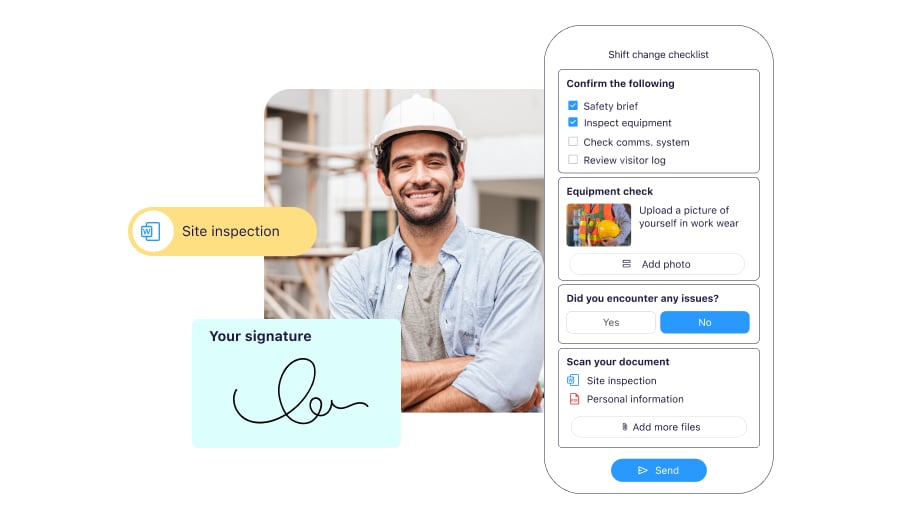Running a successful construction business involves finding your niche, hiring the right employees, delivering a great customer experience, using software to manage your team, and more.
Running a construction company comes with unique challenges that other businesses don’t face. You must acquire building permits, coordinate subcontractors, and construct flawless products—all while clients look over your shoulder. You also have to manage all the traditional aspects of running a business, like sales and marketing.
The good news is that if you approach these challenges well, your business can stand out. We’ve put together our 8 best tips for how to run a construction business—so you can streamline operations, enhance client satisfaction, win the work you want, and more.
Key Takeaways
- Start your business on the right foot by getting licenses and insurance and deciding what type of construction you want to specialize in.
- Carefully evaluate employees during your hiring process and offer ongoing training to ensure your company performs high-quality work. Vet subcontractors thoroughly and use trusted subcontractors whenever possible.
- Use project management, scheduling, communication, and time clock software to manage your team and reduce the time you spend on administrative tasks.
- Grow your business through marketing. If you have happy customers, ask them to provide testimonials or serve as references for your business.
8 Tips for How to Run a Successful Construction Business
Here are our 8 best tips for running a construction business in 2026. These tips are especially useful for learning how to run a small construction business successfully.
Get started on the right foot
Setting your business up for success from the very beginning is important. When starting a construction business, ensure you complete these tasks:
- Get licenses and permits: You’ll need to get a construction company license from your city, county, or state to perform any construction work. Operating a construction business without a license—or allowing your business license to lapse—can lead to costly fines and give your company a bad reputation.
- Register as an LLC: Many business owners in the construction industry register their companies as limited liability companies (LLCs). The advantage to registering as an LLC is that it separates you from your business. If your company goes out of business, banks and other lenders can’t take your personal funds to repay business debts.
- Open a business bank account: Once you’ve registered your business, you can open a business bank account. Choosing a bank that specializes in financing construction companies is a good idea. A bank like this can provide access to credit lines or loans that can help you manage cash flow.
- Purchase general liability insurance: General liability insurance protects your business in case of an accident, such as an injury on a job site or in a building your company built. Your business should always have liability insurance for construction.
- Purchase workers’ compensation insurance: Many states require businesses with employees to have workers’ compensation insurance. Even if it’s not required in your state, having it is essential—injuries unfortunately do happen on construction sites. A workers’ compensation claim could sink your business if you don’t have insurance.
This Might Interest You
Want to learn how to run a small construction business? Our guide to how to start a construction business in 5 steps can help you get started.
Establish a niche
The construction industry is enormous, and your company can focus on anything from building residential homes to renovating commercial buildings to erecting skyscrapers. Rather than trying to do all of these things, decide on a specialty and stick to it.
This begins by specializing in a certain type of construction: the specific category or segment of the industry your company chooses to focus on. For example, you might specialize in residential, commercial, industrial, or infrastructure projects. This choice determines the kind of projects you undertake, the expertise required, and the target clientele.
Then, you can narrow your specialty even more. For example, your construction business could focus on building new residential homes in a specific city. With enough demand, you could specialize even further—for example, on constructing colonial-style homes or townhomes.
Establishing a niche enables your business to focus on what you do best. You’ll need less equipment than if you were trying to perform many different types of construction. In addition, you can bring on a smaller group of subcontractors who have experience working with your company.
While you may want to turn jobs down if they’re outside your target market, customers will know exactly who to call when they need a job done that’s within your company’s scope.
This Might Interest You
Check out our 35 top construction business ideas to find your niche. If you’re just getting started and wondering how much the start-up cost is and what else is needed to get started, these tips can be especially useful.
Hire employees who care about their work
Hiring the right employees is crucial in any business—but especially in construction. Your employees should care that work is performed safely and correctly, or else you could end up having to make costly changes to a nearly finished project.
Hiring dependable project managers and foremen is particularly important. Most of the time, you won’t be present at job sites, so you’re relying on these employees to represent your company and ensure projects are completed on time and within budget.
Including practical assessments like on-site task simulations in your hiring process can help you evaluate candidates’ knowledge, problem-solving abilities, and communication skills. You should also ask for references—there’s a good chance a candidate has worked for other construction companies in your area in the past.
This Might Interest You
Check out our 7 top tips to hire good construction workers + construction worker job description. If you’re just getting started and wondering how to run a small construction business, these tips can be especially useful.
Offer ongoing training for employees
Offering ongoing training for your employees—for example, through training courses and construction certifications—is a great way to boost their skills and ensure they’re current on the latest construction industry trends. It’s also an opportunity to improve employee morale and show your dedication to quality and safety.
Ideally, ongoing training should be an integral part of your company culture. That way, employees are enthusiastic about improving their skills instead of viewing training as a burden.

There are several ways to offer construction worker training for your employees. You can offer online video lessons and presentations that employees can watch at their own pace, for example. Alternatively, you can host hands-on training at a current project site. This is especially opportune if a project involves an unusual problem and teachable moment.
Did You Know?
Connecteam’s employee training software enables you to create your own online training courses that employees can take whenever they want. You can monitor which courses employees have completed and follow up with employees who fall behind.
Deliver a great customer experience
The construction industry doesn’t have a great reputation for customer service. Projects routinely run long or over budget, and project managers aren’t always responsive when customers call with questions.
The upside is that your company can stand out and win more construction contracts by delivering great customer experiences.
To start, be realistic about what your company can achieve when approaching a new project. Use construction estimating software to generate realistic budgets and timelines to present to clients. Plan for supply delays or cost increases that could set your project back, and warn clients about these potential changes far in advance.
You should also make yourself available to customers. Clients feel heard when they get to talk to the boss rather than a project foreman. They also feel like their project is a priority when you show up on the job site—even if it’s just for a few minutes.
Use software to manage your team
Managing your team across multiple construction projects is one of the most time-consuming parts of running a construction business. You must ensure every project is making consistent progress while coordinating deliveries and subcontractors, managing employees’ schedules, and more.
Team management platforms like Connecteam can make these tasks much easier.
This Might Interest You
Software doesn’t have to be pricey. Discover our guide to the best free construction company software.
There are few types of software tools in particular that construction businesses need:
- Scheduling software: Scheduling software for construction crews enables you to assign employees to projects and plan out work weeks in advance. If there’s a big task like pouring concrete, you can use scheduling software to ensure all employees will be at the job site on the day the concrete truck is available.
- Project management software: Project management software gives you a bird’s-eye view of your ongoing projects. You can track progress and view upcoming milestones (for example, finishing a building’s exterior or installing plumbing). You can also assign employees to specific tasks so they know what they should be doing when they show up at a job site.
- Communication software: Communication software enables you to communicate with your employees in the field through 1-on-1 or group messages. Importantly, many communication platforms let you set up project-specific messaging channels, which isn’t possible with simple text messaging. This is great for giving updates about a project or relaying a client’s request.
- Time clock software: Time clock software enables your employees to clock in and out of work easily—often from their smartphones. This way, you can track employees’ hours accurately and pay them correctly, including for their overtime. Using time clock software can drastically cut down the time you spend running payroll for your construction business.
Did You Know?
Connecteam is an all-in-one team management solution that doubles as a construction app. It includes scheduling, project management, communication, and time clock software. It also has handy features for construction businesses—like checklists you can use to ensure employees never miss important details on a job.
Get started with Connecteam for free today!
Build a network of trusted subcontractors
Bringing subcontractors onto a project has numerous benefits. First, they often bring specialized skills that your employees may not have. For example, you can hire an electrician to wire a new home or a flooring expert to cut and lay tile.
On top of that, using subcontractors can take some of the burden of financing a construction project off your business. Subcontractors typically purchase their own supplies and bill at the end of a job, so you don’t need to pay for these materials upfront.
Taking time to carefully vet subcontractors is important. Even though someone else is doing the work, the client will blame you if there’s a problem.
Over the long term, you should build a network of subcontractors you trust and hire from that network for each job. Working with the same specialists repeatedly makes coordinating easier. It also means you don’t have to spend time assessing new subcontractors for every project.
Pro Tip
Your construction business can also win contracts as a subcontractor for larger companies. So, you should also network with larger construction companies. Should the need arise, they might contact you with opportunities—especially if they trust the quality of your work.
Market your business to win more jobs
Marketing is essential to attracting new leads, getting construction clients, and growing your construction business.
There’s a wide range of ways to market your business, including launching a website, establishing a social media presence, and running traditional TV or radio ads. These valuable marketing techniques can help get your construction business’s name out there so potential customers know who to call when they need a general contractor.
In addition, here are a few marketing approaches that work particularly well in the construction industry:
- Create a brochure or folder: When you meet with potential customers, consider leaving them with a brochure or folder of materials that explain why they should choose your company. If you have an estimate ready, enclose it in a folder along with a personalized note.
- Ask for testimonials: Glowing testimonials from customers you’ve done work for in the past can help you sway new customers to sign a contract with your company. You can share testimonials on your website, in advertisements, and in brochures you leave with customers.
- Use past customers as references: It’s a good idea to ask repeat customers if they’d be willing to serve as references for your business. You can give their phone number out to prospective clients who may feel more comfortable choosing your business after talking to someone who’s worked with you already.
- Set up a Google Business Profile: Enhance your online visibility by creating a Google Business Profile. This helps you appear in local search results and on Google Maps, making it easier for potential clients to find and contact you. Keep your profile updated with recent projects and reviews.
Pro Tip
As your business grows, consider hiring a part-time or full-time salesperson responsible for finding new customers and selling construction services. You’ll still need to get involved before signing a contract, but you can delegate a lot of the time-consuming work to the salesperson.
Conclusion
Understanding how to run a successful construction business can be challenging. However, there are many opportunities to exceed the competition and impress your customers. First, set your business up correctly, establish a niche, and hire and train employees who care about their work. You should also deliver a great customer experience, build a network of subcontractors, and market your business.
Finally, you can use team management software to streamline operations and ensure your team is aligned on every project. Connecteam offers scheduling software, project management tools, employee messaging, and more.
Try out Connecteam free today to see how it can help you run a successful construction company.
FAQs
Is a construction business profitable?
Construction businesses can be profitable, but to turn a profit, you must learn how to run a successful construction business. According to the Construction Financial Management Association, general contractors earn a net profit margin of 1.4%-2.4% per job. Successful businesses typically turn away jobs that aren’t profitable.
How do I make an estimate for a construction project?
To estimate and price a construction project, you must know the cost of your supplies and labor. You can use estimating software, but there are other methods, too. Conducting research on market prices and obtaining quotes from suppliers can help you estimate supply costs. Using historical timesheet data—the hours required for past projects and your workers’ productivity—can help you determine labor costs.

